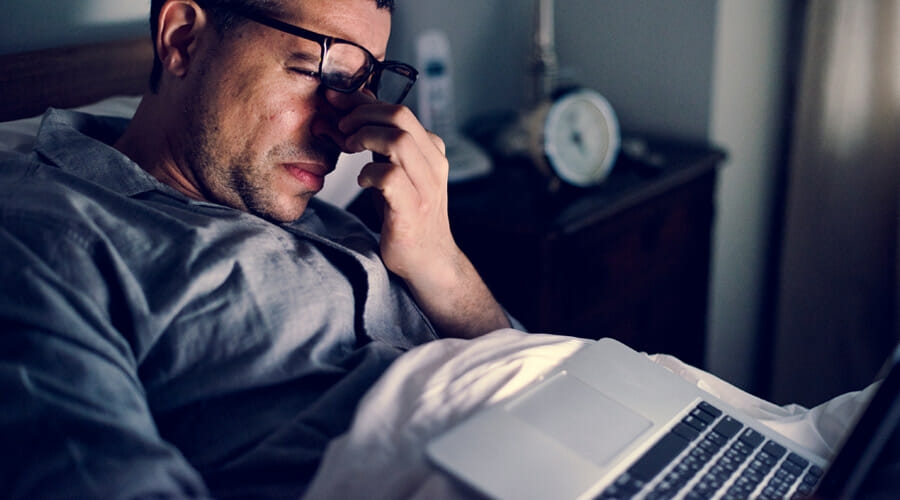Dry eye disease is a common and often unpleasant issue affecting many people throughout the UK. Some people experience dry eyes more regularly at night, which can make getting a good night’s sleep difficult. If you’re waking up in the night to gritty, sore and blurry eyes, then you’re not alone.
It is crucial to seek help from a qualified ophthalmologist to tackle this frustrating problem. An experienced ophthalmologist will be able to determine the cause of your dry eyes and help you find the right solutions to resolve them.
What Causes Dry Eyes At Night?
The eyes have three layers of tear films, and dry eyes can occur if one or more of these layers fails to function properly. The three tear film layers consist of oil, water and mucus. Issues resulting from the tear film can lead to inadequate tear production, increased tear evaporation or reduced tear quality. These issues are what lead to dry eyes.
Various factors can contribute to experiencing dry eyes more at night, including wearing contact lenses for a prolonged amount of time throughout the day or using a computer or smartphone device. Other possible causes for dry eyes that are worse at night include:
-
- Ageing
- Living in a dry or hot climate
- Hormonal changes
- Blepharitis
- The eyelid not closing completely during sleep (nocturnal lagophthalmos)
- Some medications
- Allergies
- Vitamin A deficiency
Dry Eye At Night Symptoms
It is important to understand the symptoms of dry eyes at night so you can find the most suitable treatment option. If you’re unsure that your symptoms are related to dry eyes, it is always best to talk to your doctor or ophthalmologist, who will be able to diagnose the condition and advise on the best course of action. Some signs of dry eyes at night include:
- Stinging or burning sensations
- Light sensitivity
- Discomfort while wearing contact lenses
- Watery eyes
- Redness
- Blurred vision
- A gritty or scratchy feeling in the eyes
Dry Eyes At Night And Morning
If you have dry eyes at night, you will typically experience symptoms just before bed and throughout the night, but you may also wake up with dry eyes in the morning.
The most common cause of dry eyes in the morning is nocturnal lagophthalmos. It happens when the eyelids are not able to close fully during sleep at night. If the eyelid does not properly seal, tears will evaporate on the eye, causing dry eyes at night and in the morning. Lagophthalmos is often associated with exposure to keratopathy (damage to the cornea from being exposed to the environment for a prolonged period of time) and poor sleep. If you are experiencing this, you should seek a diagnosis in order to get the proper treatment.
How To Stop Dry Eyes At Night
Night-time dry eyes can be managed in various ways, but it is crucial to first identify the cause of the problem. Contacting an expert ophthalmologist is an excellent first step, as they will have extensive experience working with people with the same condition and will be able to provide an accurate diagnosis.
At-home remedies or preventative measures are normally recommended first. Preventative options include:
- Reducing screen time, particularly before bed
- Staying hydrated
- Washing bedding regularly if you have a dust allergy
- Taking out contacts before bed
- Quitting smoking
- Reducing alcohol intake
Home remedy options for existing dry eyes include:
- Using a warm compress on the eyes before bed
- Cleaning wipes and basic eyelid hygiene is particularly helpful if your dry eyes are caused by blepharitis
- Incorporating more omega-3 in your diet
Will A Humidifier Help With Dry Eyes At Night?
Humidifiers can be a good way to combat dry eyes, but this will depend on the cause. If your dry eyes at night are caused by your environment being overly dry, then a humidifier will help, as it will add moisture to the room. A humidifier may also help with the symptoms of dry eyes that are caused by tear film issues causing rapid evaporation of tears, but it will not resolve the root cause of the problem.
Treatment For Dry Eyes At Night
If you have tried preventative lifestyle changes and home remedies but still aren’t seeing an improvement, it is best to get in touch with a professional. Expert ophthalmologists at Eye Clinic London use the latest diagnostics for dry eye that enables them to get to the root cause of the problem and to provide a comprehensive and bespoke dry eye treatment plan to help alleviate your discomfort. Common and effective treatment options include:
- Artificial tears: the most common, effective and non-invasive treatment for dry eyes is the use of artificial tears. These help keep the eyes lubricated throughout the night, ensuring you wake up pain-free. Your doctor may recommend different artificial tears for use at night and during the day.
- Lumenis Optima M22 IPL: if your dry eyes at night are caused by meibomian gland dysfunction, a condition that causes inflammation of the eyelids and interrupts tear production. This treatment uses IPL (intense pulsed light) to restore the tear film layer.
- Antibiotic drops: dry eyes can cause complications such as infections in the eye. If an infection is present, it is vital that it’s treated immediately with antibiotics.





